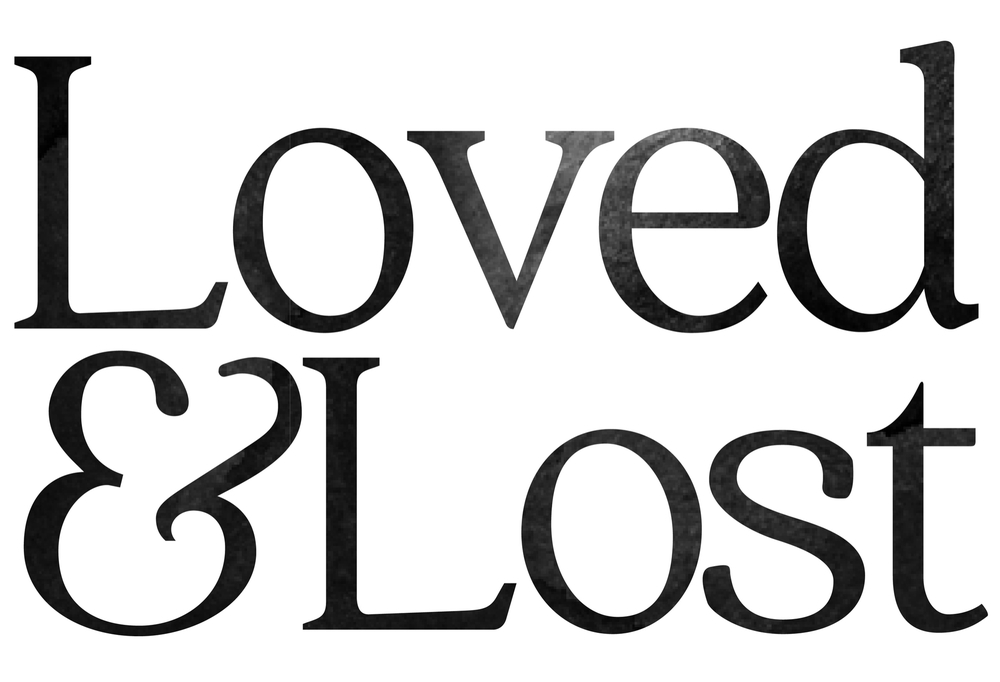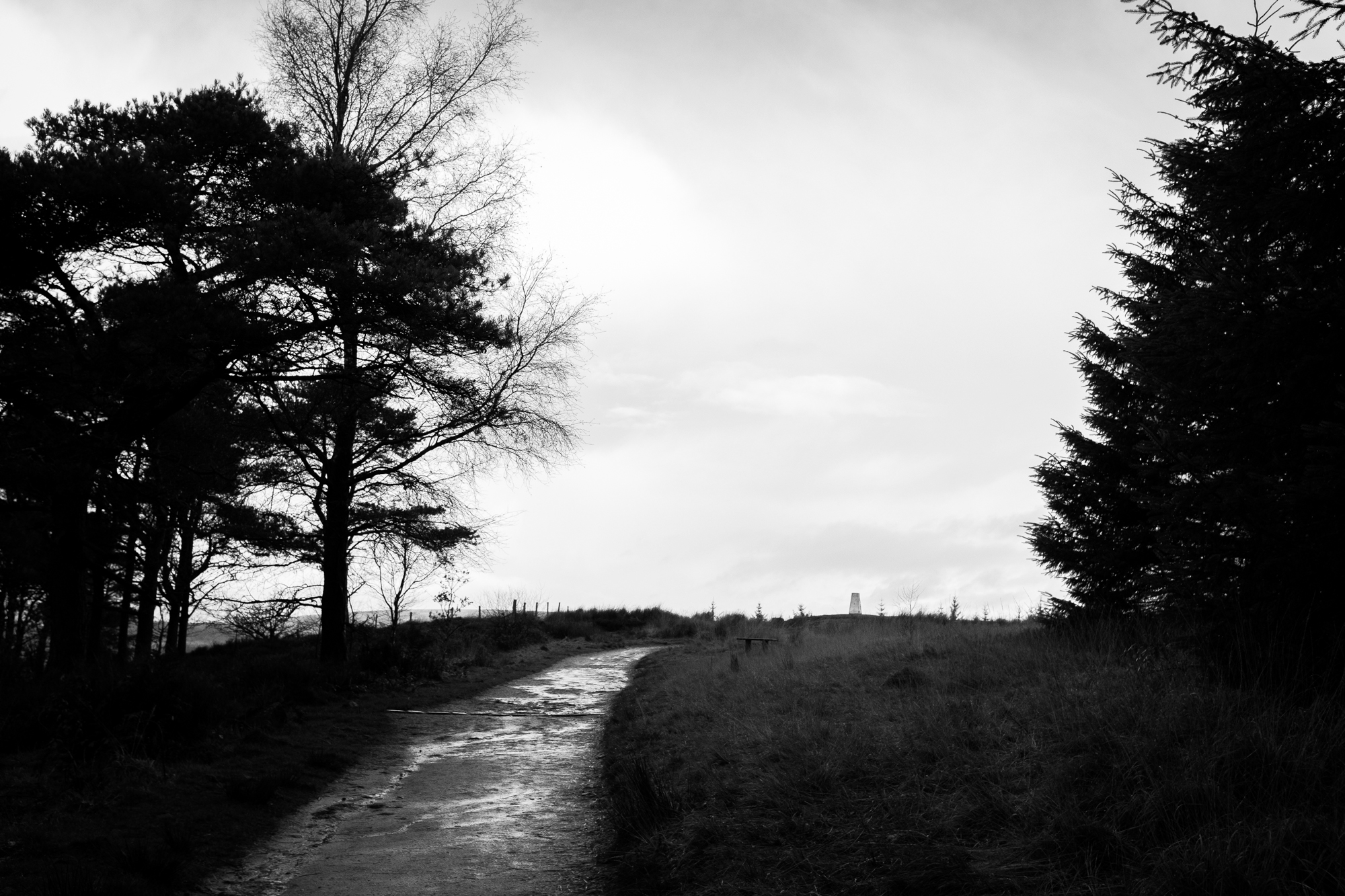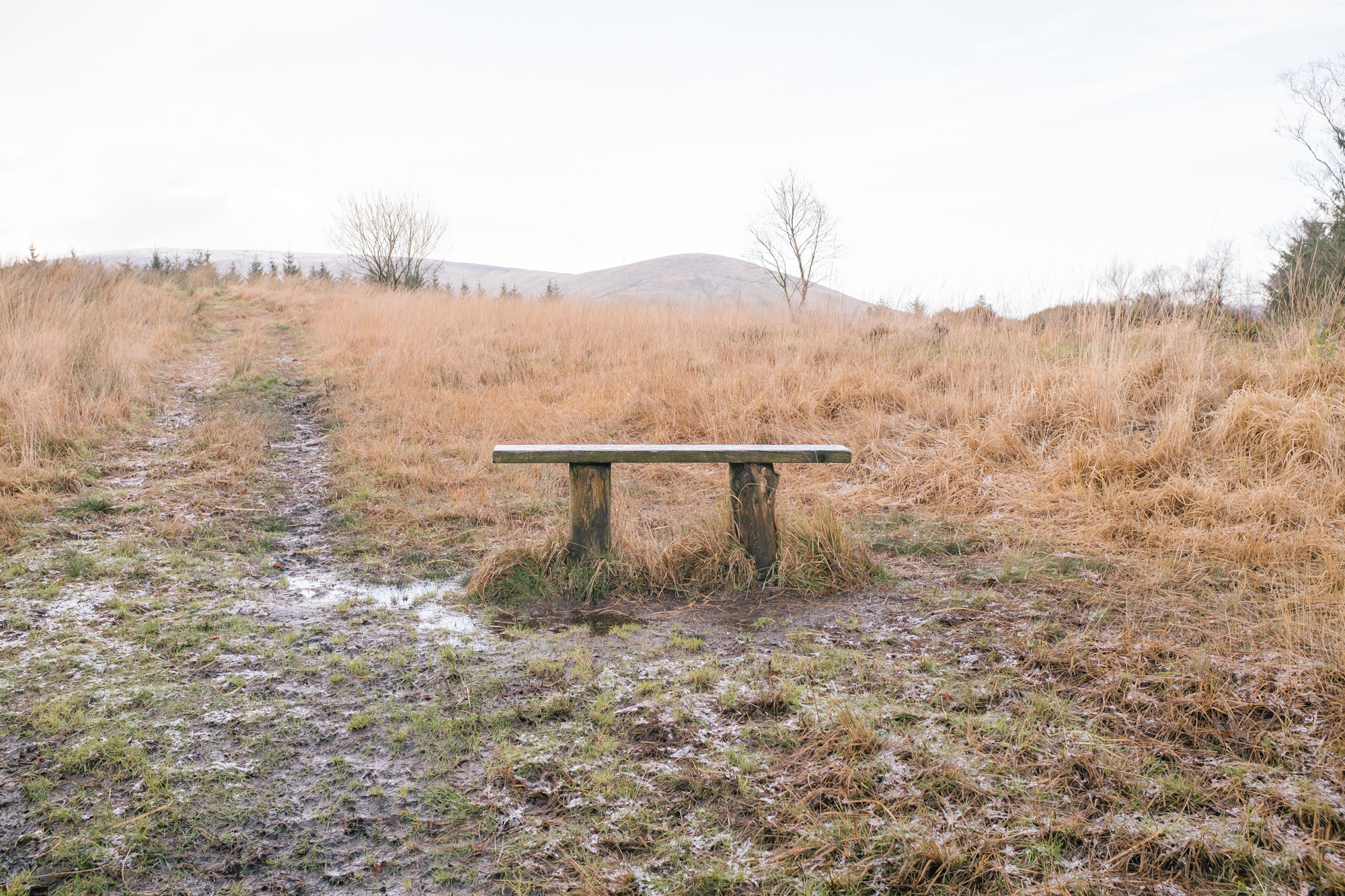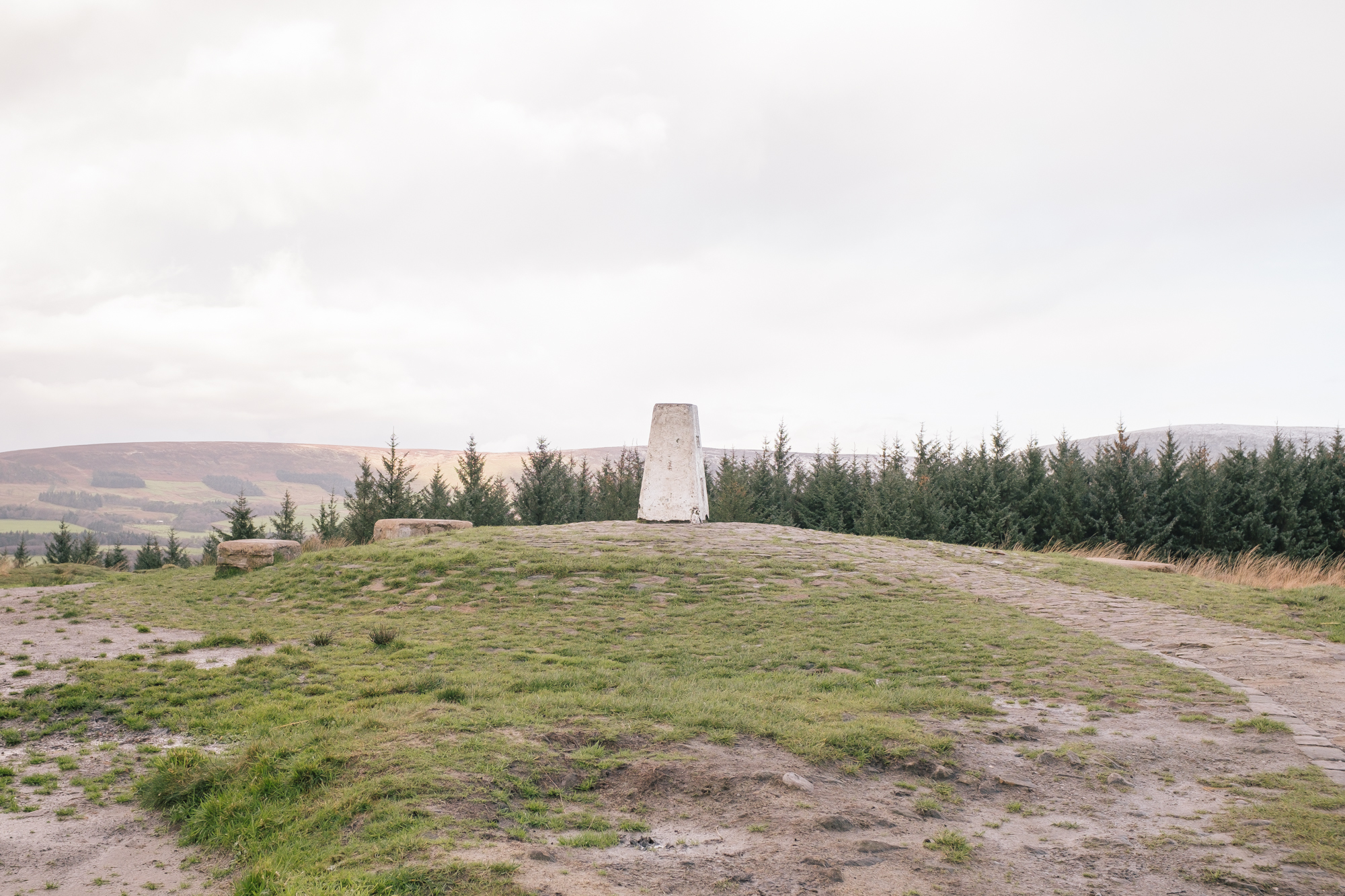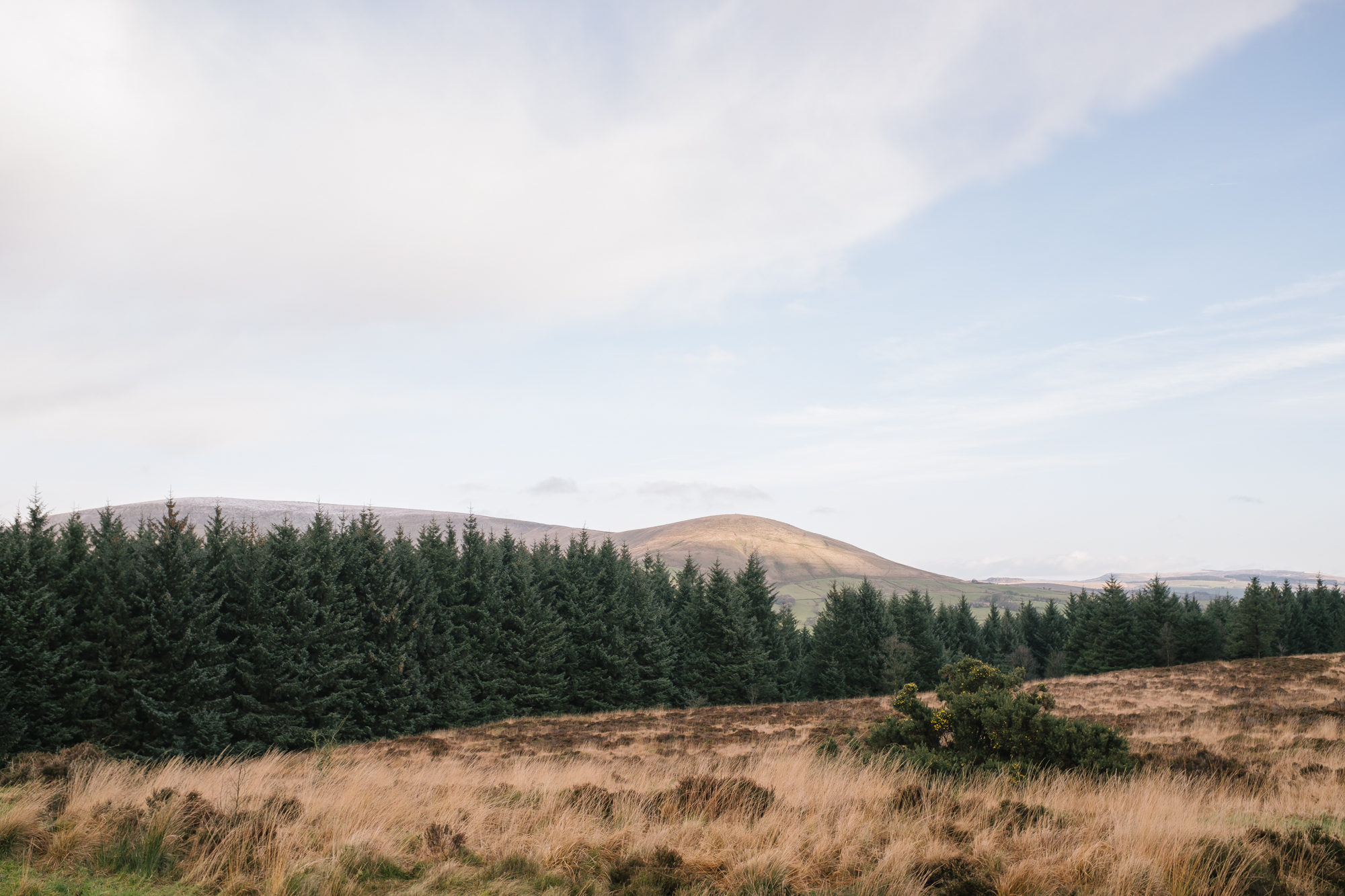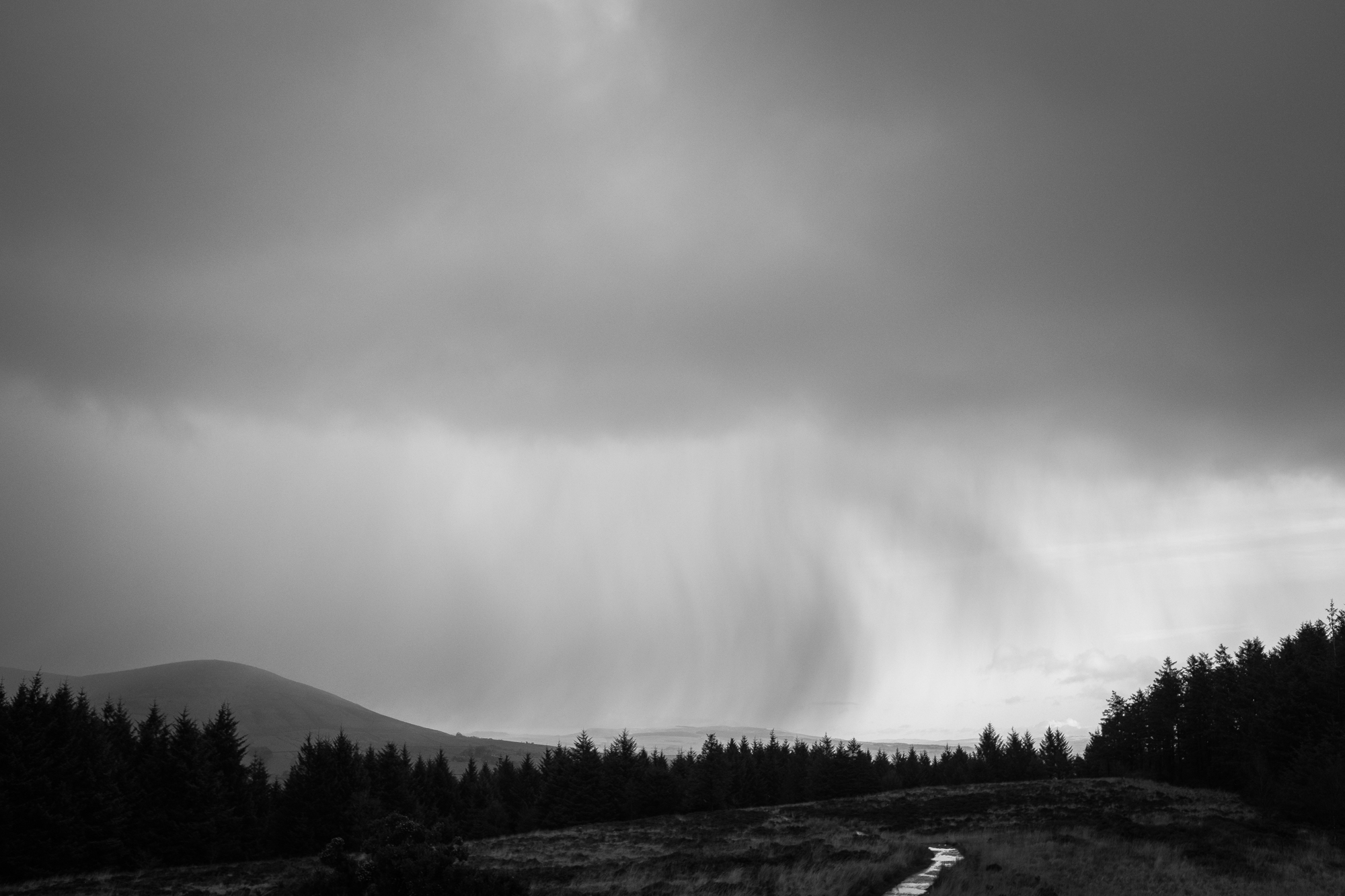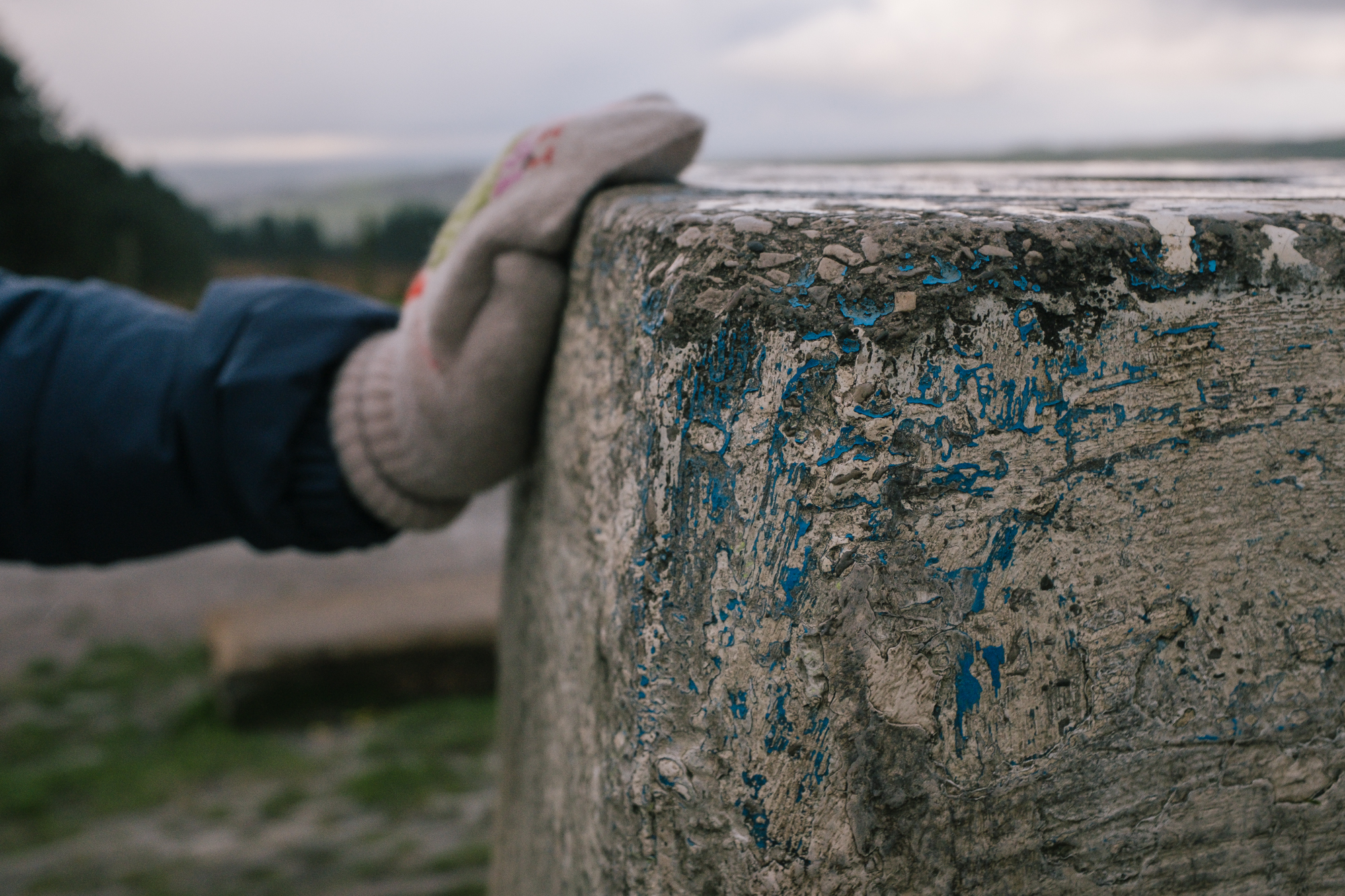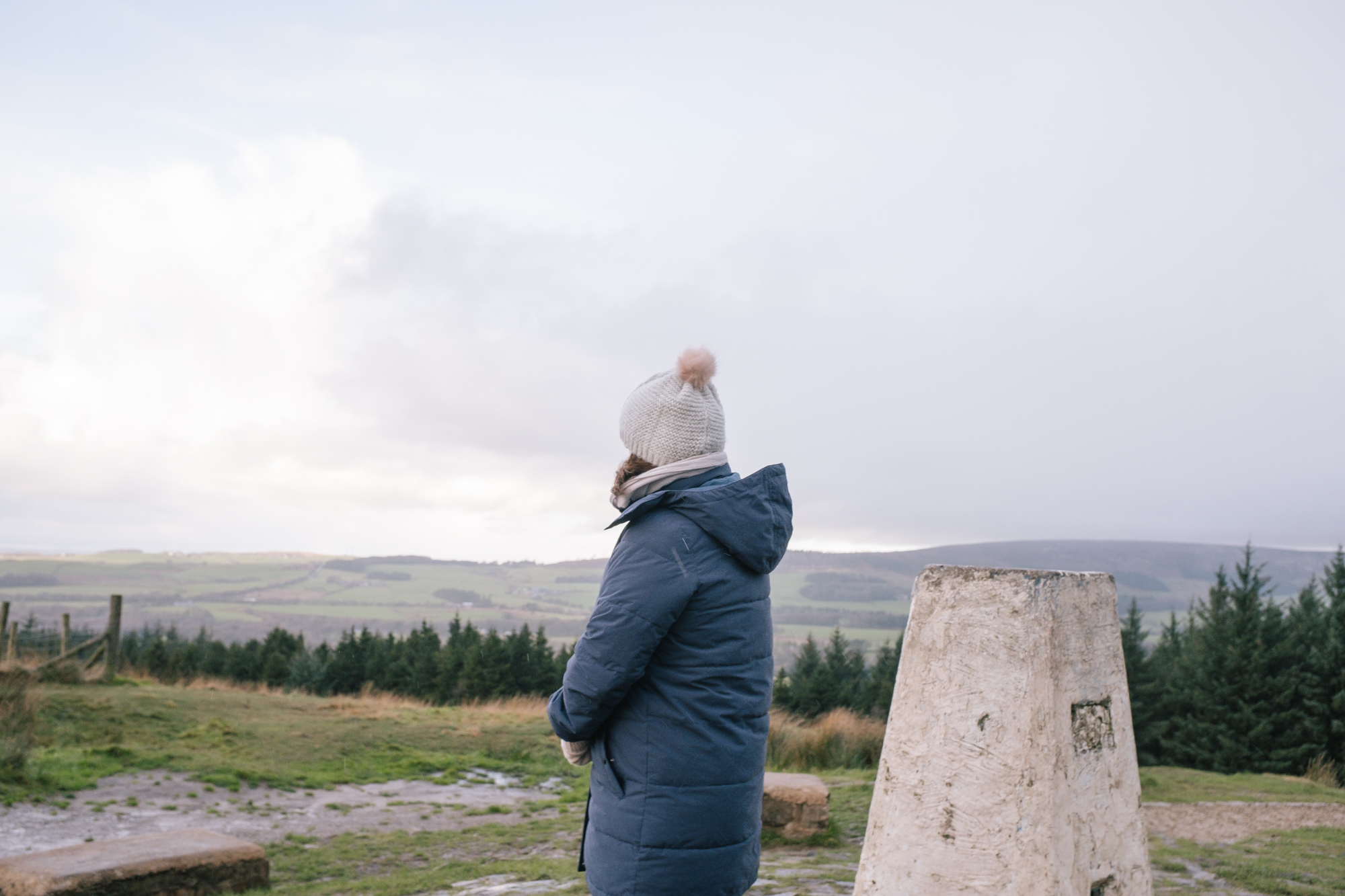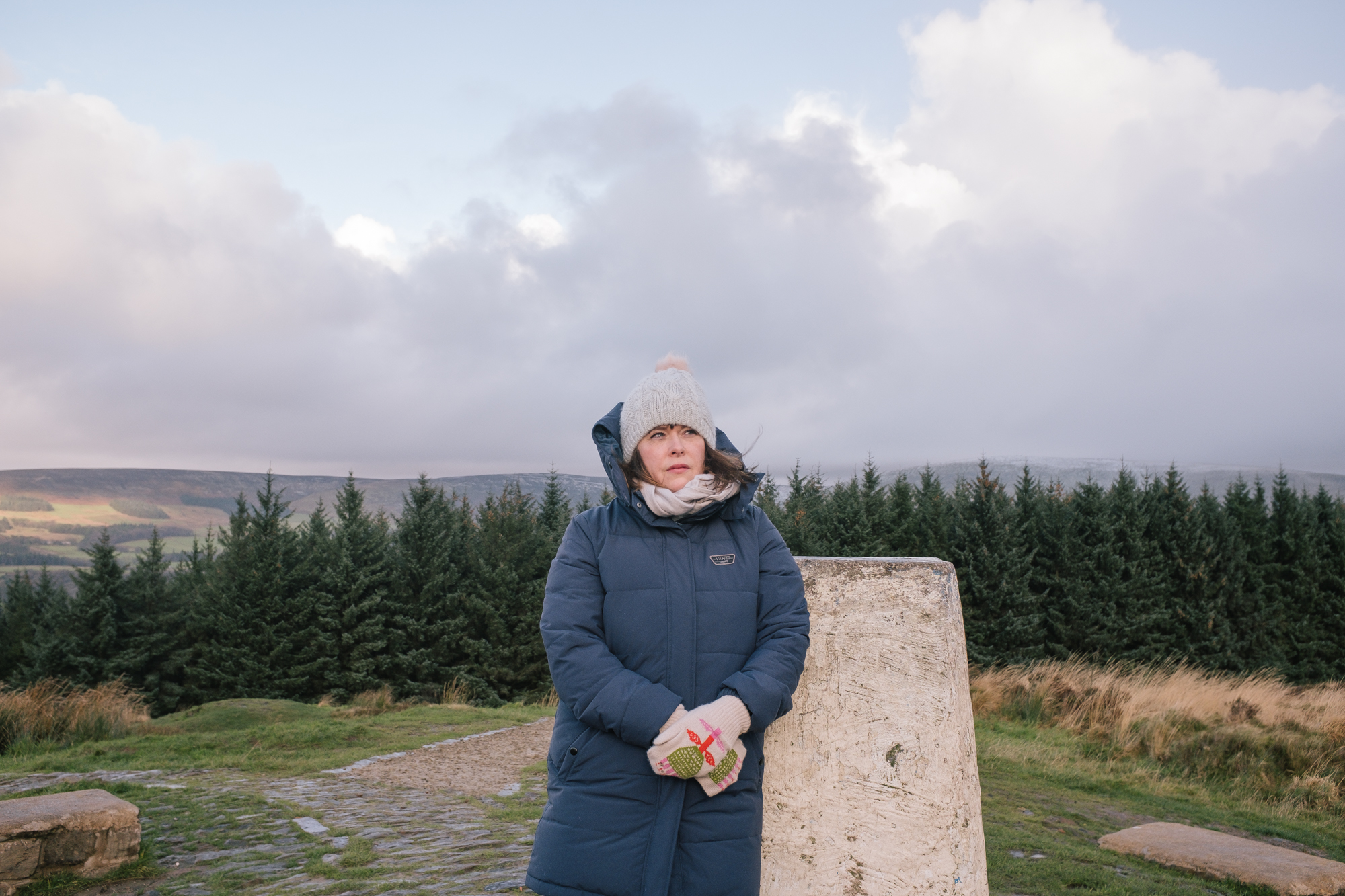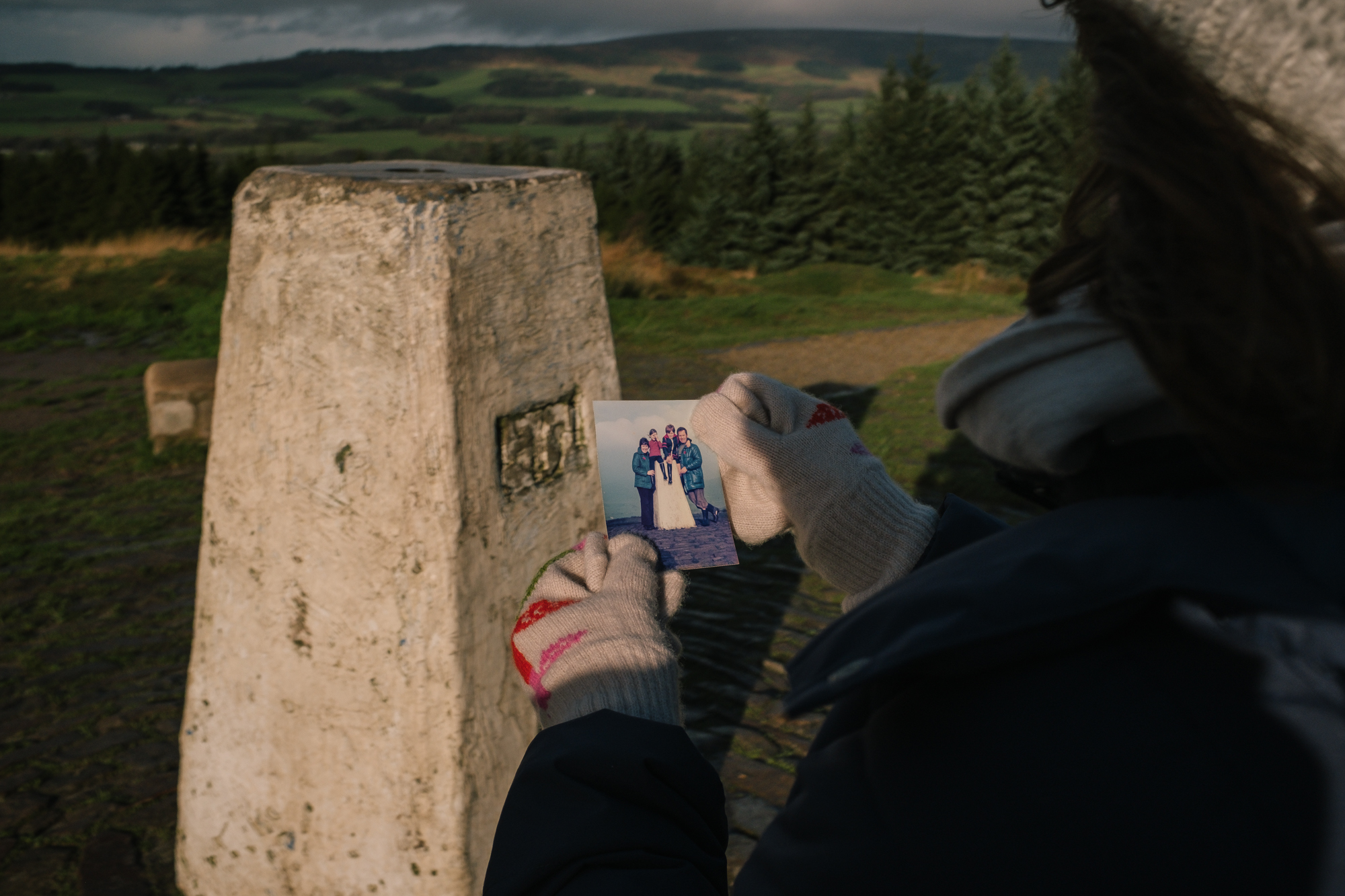Nicola with Geoff, Mum & Dad
Beacon Fell, Lancashire
Could you tell me about the original photograph?
My name is Nicola. I'm holding a photograph of me with my family on the top of Beacon Fell in Lancashire, which was close to where we lived. I think this photograph was taken, probably in 1978, because I look about six, my brother looks about eight and we moved to this area when I was 6 years old. I chose this photograph because it's one of the only photographs I have of all four of us together with no-one else, as usually one of my parents would be taking the photo, but in this one, there's someone else taking the photo for us, so it's very precious because it's all four of us together.
Can you tell me much about the day it was taken?
I don't remember the photo being taken, it was 40 years ago! It would have been a day out at the weekend or possibly half term, maybe with other members of our extended family. I can tell it's November because my parents are both wearing poppies. We did go there a lot, so I have memories of going there but not of that actual occasion.
Could you describe for me what's in the picture?
In the picture, we've gone to the summit at Beacon Fell and there's the ordnance survey marker there to say it's the highest point in the area. We've walked to the summit and posed for this photo. Someone's given my brother Geoff and me a lift up onto the pillar and we're standing as a family. Everyone looks like they're smiling, my face is a bit concealed. We look like we're holding onto each other. My mum is holding onto me and my dad and Geoff are holding onto each other. I like the fact that my mum and dad are wearing matching anoraks, I actually remember those coats and recall my dad wearing that coat. I remember going to a bonfire night with fireworks and being scared of the loud fireworks and he would envelop me in that coat to protect me from it.
I'm wearing a jumper that I do remember really well that my Granny made for me on her knitting machine. She knitted jumpers for us on her knitting machine and sent them. That pink jumper had little lazy daisies embroidered on it, round the neck and by the pocket and in the pocket she'd made a tiny little doll out of the wool that the jumper was made from. That would be exciting because I knew it would be there, so when it arrived I would look for that! Because I had an older cousin, she would get the same jumper, so I'd end up having 2, the one for me and then when she grew out of hers, I'd have hers! I can remember the feel of the wool.
Is it a particularly special place? Is it somewhere you've been back to?
I left that place when I was 16. I haven't been back since, until today. That was 30 years ago, so I probably did go there as a teenager but I don't remember, I place it more in my childhood really.
So how does it feel to be back today?
Well in the photograph the pillar looks really big, but when we got there it looked a lot smaller and a little bit unassuming on the landscape. To me it looks like a great monument and it really isn't, it's quite small! It felt nice to be there and stand next to it, but even though I recognise the pavement around it and the pillar, when I was standing there I didn't feel like I recognised the view, although I did recognised all the colours on the landscape, they were very familiar. Actually, one hill in the distance was familiar, but it seems like a lot of trees have grown since then. If this photograph was 40 years ago then all those fir trees around it would have been a lot smaller then.
I really like the fact that my dad's wearing work trousers crammed into a pair of wellies. Quite near to the end of my dad's life, he said, very proudly that he'd never once in his life owned a pair of jeans, and my mum said she hadn't either, so I remarked on how unusual that was, for two people that have lived through half of the 20th century and never worn jeans! So when I look at this picture I can see they're actually both wearing slacks for a country walk. My dad's trousers are clearly quite flared, because he's had to cram them into probably a pair of hiking socks and they're blousing out of the top of the wellies and that just makes me smile. He doesn't really look like a seasoned walker, which we weren't really.
"My daughter didn't know what had happened and I had to tell her that uncle Geoff had died and she said "Oh mummy, you're the only one left who lived in your house when you were little", which was just such an amazing way of putting it, she cut right to the truth immediately, like only a child could."
Usually the next question I would ask would be about the person who's not around anymore, but in your situation there are three people who aren't around anymore. I wondered if you felt you could share a little bit about the people in the photograph?
Well that's the little girl with a family and all of those people have now gone...and I was the youngest in the family, but now I'm a grown up. My mum died first, she got ill and she died, and we were all with her when she died, so all the people in that photograph were with my mum when she died. Then 18 months later, my dad died, he'd been ill for quite a long time and I was the only one with him. So we were together. It was actually hugely important to me that I was both of my parents when they died, it feels like a great privilege to be with someone in those final moments and I was absolutely determined that I would not miss that for the world.
Geoff wasn't with my dad when he died as during that time he wasn't very well and he couldn't face it, he had suffered from anxiety and depression for many years. Then, five weeks after my dad died, my brother took his own life, and that eclipsed everything, everything that had gone before was put into the shade really with the shock of that. Obviously I wasn't with him when he died and that was very difficult, to think of his final moments without anybody with him, but I did go and see him in the chapel of rest a few days later, because I wanted to witness that as well. And that's all very heavy, and that's me.
What is very hard to do, and I think it's because it probably shouldn't be done, is that I can't hold in the same frame this photograph and those images of what I've just described. Seeing those people after they'd died, I can't hold them in the same frame in my mind and I think that's probably because I don't need to, because there's 40 years in between them and this is a vibrant young family. My parents here are younger than I am now, my mum had me when she was 32, she would be about 38, so she's a young woman. My dad is a handsome young man, 5 years out of the navy with their lives ahead of them and their two young children. I want to see them as separate things.
You must have lots of memories of your time together as a family within that frame of life, as you described it, lots of times that you shared as a four. Can you hold onto those quite dearly?
We had lots of good holidays, my dad was quite adventurous, so he would plan these great holidays in Europe travelling around. I've got lots of family photos of those. I know that we would have left this scene, we would have gone home and my dad, who was the cook of the family, would have cooked a nice dinner, maybe something like steak and kidney pie or roast dinner, or there might have been something bubbling away in a cook pot whilst we were actually here. So we would go home and the house would soon fill with lovely cooking smells.
When my brother died, I was spending time with his wife and children and my ex-husband came to pick me up from their house. My daughter didn't know what had happened and I had to tell her that Uncle Geoff had died and she said, "Oh mummy, you're the only one left who lived in your house when you were little", which was just such an amazing way of putting it, she cut right to the truth immediately, like only a child could and I said "Yes, that's true."
What sort of thoughts went through your mind in that moment?
Just shock really, because we had lost both of our parents together and we had talked about it, and imagery that's associated with that, like being the only tree left in the forest or being like a rowing boat without any oars, not really knowing which direction, having that mooring of your parents being gone. We had talked about how shaking that is but also how there's the possibility for great freedom to come from that as well because for the first time you really are just an adult and you can go in any direction that you want and do daft things without them asking you if you're sure you want to do that. Even if you're 40, they're still going to ask if you're sure you want to do that, so you really can do what you want. But in losing him, I lost the person that I could share that with and talk about them with and actually I can't talk about this photograph with anybody, because they've all gone, so there isn't anybody left who shares my childhood memories, apart from my friend who lived next door but one and maybe cousins but not really family life. There's no-one to remind me of that time something silly happened. There's no-one to say that with, and that's really hard.
Do you try and keep those memories and feelings alive in any sense?
Yeah, my daughter asks me about them and I tell her things that happened. I find myself a little bit like him with her, so one of the things he could always make me do was get really giddy and silly in a museum, so we would go to these really boring museums on holidays like a railway museum or transport museum that I thought were so dull. He would always look at something, pull a face or have some ridiculous take on something or do a silly accent and have me cracking up and then we'd have to control ourselves because we were being too silly. I've noticed that I fall into that role a bit with her, if we go to a museum, we'll go a bit silly and look at things like a stuffed animal and give it a voice, like he would do, so we can share that humour, I can share that humour with my daughter and I am aware that that comes from him.
In that sense do you feel like you're keeping him with you?
Yes. It was very hard to do after he first died, it was just too painful, but I feel like I can now.
"I do think that having experienced such pain and loss has helped me to have a much deeper appreciation of beauty. It feels like once you've been to a place of such pain, you have a deeper understanding of the world around you and I just, well, I look on life differently."
Did you have any period when you felt, I don't want to put words in your mouth, but maybe angry about it or guilty that you were the only one left?
Yeah, I did. The thing that I felt guilty about at the beginning was he had suffered from anxiety and depression, on and off, throughout his adult life and I hadn't. I remember saying to someone, if only we could have shared it, it would have been more diluted and we could have both had periods of milder depression that we would have been able to cope with, but instead, he had it and I didn't. That just seemed like really bad luck for him. So I did feel a bit guilty about that.
Sometimes if I experience something now that's just a really simple pleasure like looking at the clouds or seeing a really lovely yellow, I'll look at that yellow and think, "I love that yellow", and then I'll think "They can't see it, I'm the only one that can see it", and it makes me feel a bit guilty for seeing it. That's only the case if it's something really simple, not like going to see a good film or those sort of pleasurable experiences, but just something really simple like the shadow of a cloud on a hillside or a yellow flower, and I'm so glad that I can see that but I don't think I had those thoughts before they died. I wouldn't have noticed that yellow, I wouldn't have stood at a yellow flower and thought, "Wow, look at that", I love that, because I just wouldn't have noticed it. I do think that having experienced such pain and loss has helped me to have a much deeper appreciation of beauty. That's a wonderful thing, isn't it. A sunset can suddenly take my breath away, make me want to cry at its beauty, but before it was just another sunset.
Do you think that's because you're more emotionally engaged in the moment? Or is it tied into the fact that you'd like to be sharing that moment with somebody that you can't share it with?
Well, for me, it feels like once you've been to a place of such pain, I feel like I have a deeper understanding of the world around me and I just, well, I look on life differently. So i'll look at something and want to stand and appreciate it and experience it more than I did before, like music. It wasn't that long after, well about 6 months after Geoff died, I went to see 'Coppelia' with my daughter, the ballet and as soon as the curtains opened I just couldn't stop crying. It was the orchestra and the curtains opening on this beautiful scene, I just couldn't stop crying! I'd loved the ballet before, but it hadn't ever had that impact on me before.
In that sense, would you say certain experiences are more profound?
Definitely. Absolutely, yeah.
Things just have more meaning?
Yes. In a way, that is a gift, isn't it. When people die and there are great losses, with that change there also comes some gains, even though, a million times over I'd rather that they were sitting here with me now, but they're not. It's hard to say that, because it does sound, without the things that I've said before hand, it sounds very harsh and I don't mean that at all, but it is a gain, to be able to look at the yellow flower and see it differently to how I ever did before.
I suppose, actually, to the reader, that might feel like quite a basic positive to get out of a hugely significant, life-transforming experience of loss, but there's a lot of people that I've talked to through the project who've experienced loss who have said it completely reframes everything and there's a desire to find something positive out a huge negative. For me, it's working on this project, having these conversations and sharing these stories. It's my way of try to make something positive out of something that was hugely painful. That manifests itself in different ways for different people, some change their career path in order to look to help people in different ways, or as you've shared, to see the world in a different way. I think it's quite a natural response actually.
Yes, because nothing will ever be the same again. I remember when my mum died, I felt winded by the thought that I would never see her again. Ever. Not just that I wouldn't see her again, but forever and ever. That was really hard. Life is never the same again. In this photograph I am a daughter and a sister and I'm no longer those things. Friends have said to me, "Oh but you are, you're still your mum's daughter, you're still Geoff's sister", but actually, I'm not really. I am my mum's daughter, but no-one thinks of me as a daughter, no-one calls me their sister. So your identity changes forever, and I can say I had a brother and I know what it feels like to be a little sister and I know what it feels like to have a father and to be a father's daughter, but I am no-longer those things, and that is really hard.
"The thing that I felt guilty about at the beginning was he had suffered from anxiety and depression, on and off, throughout his adult life and I hadn't. I remember saying to someone, if only we could have shared it, it would have been more diluted."
I've never heard anyone frame it in that way actually, that is really hard. That's a significant acknowledgement to make.
I can still feel like my mum's daughter, sometimes. Last night, when we arrived at the cottage we were staying in, I was knitting, and she was a big knitter, and I went wrong and I couldn't work it out, I'd made a mistake, and I could almost hear her, feel her looking over my shoulder saying, "What's going on here?" I felt her presence, not in a weird ghostly way, but in a 'within me' way. So I do still feel that, but I don't go anywhere where I'm a daughter or a sister now.
What was it like when I asked you about finding a photograph for the project? Was it fairly obvious which one it would be?
This photograph, I don't remember doing this, but quite early on when I cleared my parent's house, I took all the photo albums to my house. I found this one in the albums and because it's all four of us I took it out and put it on the fridge, so it's been on the fridge probably for about four years. I've not actually really looked at it properly, I just thought that it was all four of us and put it on the fridge!
When I saw the article in The Guardian and got in contact with you I knew straight away that this would be the one. I took it down and I really looked at it and I noticed things on there that I'd never noticed before, like the fact that my parents are wearing poppies, so that told me what time of year it was, which is why I wanted to come back at this time of year. I started to think about the fact that they were wearing poppies and that it was probably 1978, so that was only 30 or so years since the end of the second world war, which if that was me now, is like the war ending when I was 15, so it would be very very much in my consciousness, whereas it isn't now. The fact that they're wearing poppies roots that photograph in time, in the 20th century, which is amazing, because it's my personal artefact, it's not some historical artefact, it's personal and my dad was in the Royal Navy, not at this point, but he left when I was a baby, so he may have only just been five years out of the navy. He was in the forces, so he probably wore that poppy with pride, for the people that went before him. I would have had no sense of that in that photograph, I just went on a walk with my mum and dad. Most people put a poppy on a smart coat, they don't put it on an anorak. Perhaps they did then, who knows, but that was one of the things I noticed when I really looked at it properly....and my dad's flares in his wellies.
"I am my mum's daughter, but no-one thinks of me as a daughter, no-one calls me their sister. So your identity changes forever, and I can say I had a brother and I know what it feels like to be a little sister and I know what it feels like to have a father and to be a father's daughter, but I am no-longer those things, and that is really hard."
There's something that photographs can do in that sense which is preserve things in a way a memory could never do. The benefit of time allows us to see those things, those details, because they're captured in an image. I think that's a beautiful thing, it's so important for you that you've got that photograph, that you pulled it out of an album because of the people in it but then it's speaking to you in lots of different ways, that's really quite incredible.
Geoff experienced, at times in his life, great anguish and great torment, but in this photo he's really casually thrown his arms around my dad's neck and I really like that. He's grinning and peering towards the camera, he looks carefree. I don't know why my hands are in my face, maybe my hair was in my eyes or the sun was in my eyes.
It does feel very natural, carefree is quite a nice word. You pointed out earlier that Geoff's got his shorts on in November!
He always wanted to wear shorts, because really all he wanted to wear all year round was football kit, he was a really keen footballer. He had lots of kits for football teams all over the world and, I can't tell what he's wearing, it's probably not, but he may be wearing football kit then, but he's wearing shorts and wellies in November, probably long knee socks. He probably did run to the top of that summit, whereas I would have been complaining of earache and maybe I did have earache, because I did have it a lot as a child, but he would run to the top and get my dad to time him or something to beat his previous score!
In a way, his personality comes through with the shorts. I remember that anorak really clearly as well, because I often got hand me down anoraks from him and I can remember my mum or me saying that wasn't an anorak to be handed down because it's very much a boys coat and I thought I'm not wearing that! I can remember that I wasn't going to get it handed down to me thank goodness!
"When someone dies, it can be so shocking and you feel like it ought to be very very noisy, like people banging drums and playing trombones and shouting, and actually its very quiet, because that person's gone, so you don't hear their voice anymore. After the funeral, you are left in a very quiet place, sometimes that can feel wrong because the feelings aren't very quiet."
How did it feel to re-stage the picture, to stand there again?
I think I was worried that when I got to the top I would feel this great sense of emptiness, but actually I didn't really, I just felt that I'm the one left and here I am, actually almost like I was bearing witness to something, I don't know. I was that little girl in that photo and now I'm the woman and I'm here again, it just felt really simple.
It does feel right that I picked a photo that's in a high up place, as we were talking about earlier, especially after my mum died, one of the things that I've felt compelled to do was to go to high up places. To look down on the world from a viewpoint and I think that was something about being able to access or get in contact with something that felt very very big and vast and empty. If you stand at a viewpoint and look down, then maybe you can get some sense of looking at something inside yourself and making a bit of sense of it.
When someone dies, it can be so shocking and you feel like it ought to be very very noisy, like people banging drums and playing trombones and shouting, and actually its very quiet, because that person's gone, so you don't hear their voice anymore. After the funeral, you are left in a very quiet place, sometimes that can feel wrong because the feelings aren't very quiet. So I think, perhaps, although it feels like I chose this picture very quickly without much thought, I actually think it's because it felt right, because it was a very quiet place and a high up place.
I'm amazed by your sensitivity to your whole experience, the way you're able to express things and appreciate things, it's hard to put into words really, impressive isn't the right word, but that's what I mean I suppose. Going through losing three people it's something that most people wouldn't ever want to even imagine, especially in fairly quick succession, but the perspective that you have and the understanding of your place within that and how that engages with the outside world is really quite something special.
One of the things that I think has helped me to carry on with my life in the face of such loss, is to think what they would want for me. If they could see me and know what I've been through, I know that all three of them would have huge compassion for me, the littlest one. They would say, you must live well, and I think that's the best memorial you can give to someone, when they've gone, is to live well, for them as well as yourself.
